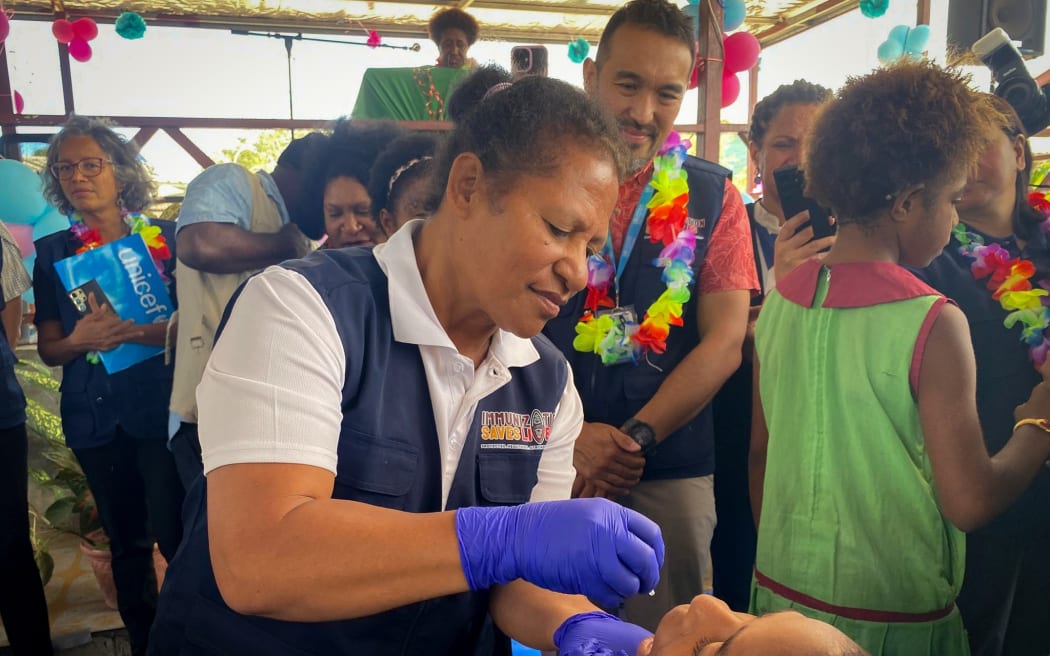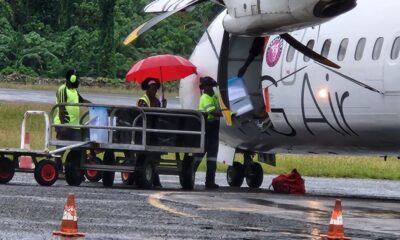World
Papua New Guinea Launches Polio Vaccination Campaign Amid Outbreak

In Papua New Guinea (PNG), health officials reported over 31 instances of the poliovirus since the disease resurfaced earlier this year. The World Health Organisation (WHO) confirmed these figures on Monday, coinciding with the launch of a national immunisation campaign in Port Moresby aimed at combating the outbreak.
The WHO declared a polio outbreak in May 2023 after two children tested positive for the virus. Polio, or poliomyelitis, is a highly infectious disease primarily affecting children under five years of age but can also impact older individuals. While many infected do not exhibit symptoms, the disease can lead to irreversible paralysis in approximately one in 200 cases. The virus spreads through person-to-person contact or consumption of contaminated food and water, particularly in areas with inadequate sanitation.
Since May, the WHO has confirmed more than 31 detections of the poliovirus through environmental and community surveillance in PNG. Although no cases of paralysis have been reported so far, the potential for further transmission remains high due to low immunisation rates and challenges in reaching children in remote areas. The WHO clarified that healthy children who contract the virus without symptoms do not meet the clinical definition of polio cases, which requires the presence of acute flaccid paralysis.
Vaccination Campaign Targets High-Risk Areas
The current immunisation campaign will focus on 17 mainland provinces identified as high-risk for polio transmission. The campaign involves administering both the oral polio vaccine and injectable polio vaccine to enhance community protection. In contrast, the New Guinea Islands provinces are deemed lower-risk, where a single round of the injectable polio vaccine is planned.
“This moment represents more than just a public health initiative – it is a bold step forward in our shared mission to secure the health and future of Papua New Guinea’s youngest generation,” stated Dr Masahiro Zakoji, WHO representative in Papua New Guinea. The urgency of this campaign is underscored by findings from UNICEF, which revealed that only about 50 percent of children born annually in the country receive essential life-saving vaccines, including the oral polio vaccine. This translates to approximately 120,000 children remaining unvaccinated each year.
To prevent outbreaks and achieve herd immunity against polio, vaccine coverage should reach at least 95 percent, according to UNICEF. Despite a global decline of over 99 percent in polio cases over the past 35 years, millions of children are still at risk, primarily in “fragile settings” affected by conflicts, natural disasters, and humanitarian crises.
Historical Context of Polio in Papua New Guinea
Papua New Guinea was declared polio-free in 2000, but a resurgence of vaccine-derived polio type 1 occurred in 2018, resulting in 26 cases across nine provinces. The US Centre for Disease Control and Prevention (CDC) noted that this strain was linked to the weakened live virus used in the oral polio vaccine. If the weakened virus circulates in populations with low immunisation rates or remains in an immunodeficient individual, it can mutate into a pathogenic form that causes illness and paralysis.
The 2018 outbreak was ultimately controlled through multiple rounds of vaccination, community engagement, and enhanced disease surveillance. The current outbreak relates to vaccine-derived poliovirus type 2. In May, PNG’s health department indicated this strain is a rare variant that can arise in under-immunised communities but is manageable through vaccination efforts.
The ongoing immunisation campaign represents a critical response to the challenges posed by low vaccination rates and the potential resurgence of polio in Papua New Guinea. As health authorities strive to protect the nation’s children, the commitment to vaccination remains crucial in preventing further outbreaks and securing a healthier future.
-

 Sports1 month ago
Sports1 month agoNetball New Zealand Stands Down Dame Noeline Taurua for Series
-

 Entertainment1 month ago
Entertainment1 month agoTributes Pour In for Lachlan Rofe, Reality Star, Dead at 47
-

 Entertainment1 week ago
Entertainment1 week agoNew ‘Maverick’ Chaser Joins Beat the Chasers Season Finale
-

 Sports1 month ago
Sports1 month agoSilver Ferns Legend Laura Langman Criticizes Team’s Attitude
-

 Entertainment2 months ago
Entertainment2 months agoKhloe Kardashian Embraces Innovative Stem Cell Therapy in Mexico
-

 Sports2 months ago
Sports2 months agoGaël Monfils Set to Defend ASB Classic Title in January 2026
-

 World3 months ago
World3 months agoPolice Arrest Multiple Individuals During Funeral for Zain Taikato-Fox
-

 Politics2 weeks ago
Politics2 weeks agoNetball NZ Calls for Respect Amid Dame Taurua’s Standoff
-

 Entertainment3 weeks ago
Entertainment3 weeks agoTyson Fury’s Daughter Venezuela Gets Engaged at Birthday Bash
-

 Sports3 weeks ago
Sports3 weeks agoHeather McMahan Steps Down as Ryder Cup Host After Controversy
-

 Entertainment3 weeks ago
Entertainment3 weeks agoTyson Fury’s Daughter Venezuela Gets Engaged at Birthday Bash
-

 World3 weeks ago
World3 weeks agoNew Zealand Firefighters Plan Strike on October 17 Over Pay Disputes



















